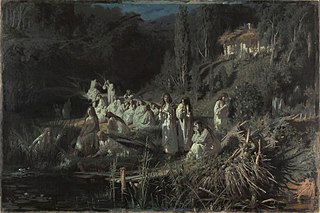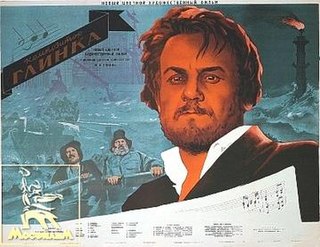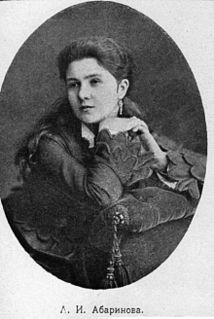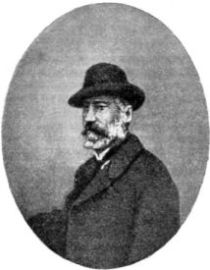Others
- Russian monitor Rusalka, a Russian ironclad which sank near Helsinki, Finland on September 7, 1893
- Russalka Memorial in Tallinn, by Amandus Adamson
Rusalka is a water-nymph in Slavic mythology.
Rusalka may also refer to:

Alexander Sergeyevich Pushkin was a Russian poet, playwright, and novelist of the Romantic era. He is considered by many to be the greatest Russian poet, and the founder of modern Russian literature.

The Stone Guest is a poetic drama by Alexander Pushkin based on the Spanish legend of Don Juan, spelled Don Guan by Pushkin.

Alexander Sergeyevich Dargomyzhsky was a 19th-century Russian composer. He bridged the gap in Russian opera composition between Mikhail Glinka and the later generation of The Five and Pyotr Ilyich Tchaikovsky.

The Stone Guest is an opera in three acts by Alexander Dargomyzhsky from a libretto taken almost verbatim from Alexander Pushkin's 1830 play of the same name which had been written in blank verse and which forms part of his collection Little Tragedies.

May Night is a comic opera in three acts, four scenes, by Nikolai Rimsky-Korsakov from a libretto by the composer and is based on Nikolai Gogol's story "May Night, or the Drowned Maiden", from his collection Evenings on a Farm Near Dikanka.
The queen of spades is a playing card in the standard 52-card deck.

Rusalka is an opera in four acts, six tableaux, by Alexander Dargomyzhsky, composed during 1848-1855. The Russian libretto was adapted by the composer from Aleksandr Pushkin's incomplete dramatic poem of the same name. It premiered on 4 May 1856 at the Theatre-circus, conducted by Konstantin Lyadov, choreographed by Marius Petipa and Nikolay Goltz, but was badly received predominantly by the aristocracy.

In Slavic folklore, the rusalka is a typically feminine entity, often malicious toward mankind and frequently associated with water, with counterparts in other parts of Europe, such as the French Melusine and the Germanic Nixie. Folklorists have proposed a variety of origins for the entity, including that they may originally stem from Slavic paganism, where they may have been seen as benevolent spirits. Rusalki appear in a variety of media in modern popular culture, particularly in Slavic language-speaking countries, where they frequently resemble the concept of the mermaid.

The Private Opera, also known as:
Prisoner of the Caucasus may refer to:
Nikolai Nikolayevich Lodyzhensky was a Russian composer and diplomat.

Maxim Dormidontovich Mikhailov was a Russian bass. His son, Igor Mikhailov (1920-1983) was the bass of the Bolshoi for several decades. His grandson Maxim Mikhailov (1962–2018) was also a bass singer.
The Stone Guest may refer to:

Kompozitor Glinka is a 1952 Soviet biographical film directed by Grigori Aleksandrov.
Dubrovsky (masculine), Dubrovskaya (feminine), or Dubrovskoye (neuter) may refer to:
Vyacheslav Michailovich Polozov nicknamed "Slava", is a Soviet-born opera singer, professor of voice, entrepreneur. He sang at many opera houses around the world, appearing in a variety of leading roles from lyric to dramatic repertoires in French, Italian, German and Russian. Laureate International Competitions. Meritorious Artist of the Byelorussian SSR.

"I Loved You" is a poem by Alexander Pushkin written in 1829 and published in 1830. It has been described as "the quintessential statement of the theme of lost love" in Russian poetry, and an example of Pushkin's respectful attitude towards women.
A Feast in Time of Plague is an 1830 play by Aleksandr Pushkin. The plot concerns a banquet in which the central figure taunts death with a toast "And so, O Plague, we hail thy reign!". The story is based on 4th scene of Act 1 of John Wilson's play "The City of Plague" (1816).

Antonina Ivanovna Abarinova was a Russian Empire opera singer who performed at Maryinsky Theatre, while being also an Alexandrinsky Theatre actress.

Feofil Matveyevich Tolstoy, was a Russian composer, music critic and writer who used the pseudonym Rostislav.